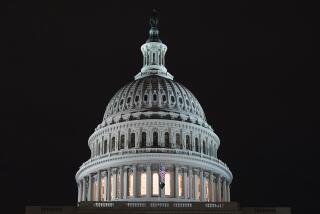House Panel Votes to Hike Debt Limit to $2.32 Trillion
WASHINGTON — The House Ways and Means Committee, moving to forestall a government financial crisis later this month, approved a two-month temporary increase in the national debt limit Monday.
The committee by voice vote sent to the full House a bill to increase the Treasury’s borrowing ceiling to $2.32 trillion. Committee Chairman Dan Rostenkowski (D-Ill.) said the House will vote on the measure Wednesday.
The government’s current debt limit of $2.3 trillion will revert, by law, to $2.111 trillion at midnight Friday. Because the Treasury has already borrowed near to the upper amount, no new government debt--not even sales of savings bonds--will be allowed beginning Saturday and all government obligations would be paid out in cash.
Treasury officials predict that the money will run out and the government will be forced to default on its obligations May 28 unless Congress acts.
The bill approved by the committee Monday would expire on July 17, creating a repetition of the current problem. However, it would buy time for congressional leaders to work out a compromise on budget reform amendments that lawmakers plan to attach to the legislation.
Sen. Phil Gramm (R-Tex.) has promised to use this year’s debt legislation for an amendment to strengthen the Gramm-Rudman law. That statute, which he helped write in 1985 as an amendment to an earlier debt bill, sets annual deficit goals for Congress with the promise of a balanced budget by the 1991 fiscal year.
Because battles over amendments could delay passage, the Administration has asked for a “clean” debt bill--without any amendments--despite the President’s support for a strong Gramm-Rudman law.
House Speaker Jim Wright (D-Tex.) agreed Monday and said his chamber will approve the short-term extension without amendment. The House will also vote on the Administration’s request for a long-term, non-reverting debt increase to $2.578 trillion, enough to last through the end of fiscal 1988.
More to Read
Get the L.A. Times Politics newsletter
Deeply reported insights into legislation, politics and policy from Sacramento, Washington and beyond. In your inbox three times per week.
You may occasionally receive promotional content from the Los Angeles Times.







